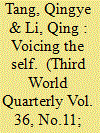| Srl | Item |
| 1 |
ID:
187833


|
|
|
|
|
| Summary/Abstract |
Drawing on China Employer-Employee Survey data collected in 2018, this study examines the effects of family ownership on firm innovation in China. Baseline regressions suggest that Chinese family firms have significantly lower R&D investment and number of patents than non-family firms, and the results are not sensitive to response quality, unobserved characteristics, and non-random assignment of family ownership. Furthermore, this gap can be effectively explained by the lower management quality of family firms. Heterogeneous analyses indicate that the low innovation of family firms appears only in more competitive environments. To improve innovation, we suggest that Chinese family firms should make increased efforts to upgrade their management.
|
|
|
|
|
|
|
|
|
|
|
|
|
|
|
|
| 2 |
ID:
161890


|
|
|
|
|
| Summary/Abstract |
Intangible capital is treated as an important determinant of economic growth in the age of knowledge economy. It has however attracted less attention in China largely due to measurement impediment. This study aims to measure intangible investment and examine its contribution to regional economic growth in China. The results show that both the coastal and interior regions in China enjoyed high growth in intangible investment during 2003–2014, especially after the year 2008. Moreover, it is found that regional disparity in intangible capital is widening and that this trend is mainly driven by the enlarging gap in investment in computer software and architecture designs. In addition, it is observed that economic competency capital is neglected in both regions, implying generally poor enterprise management in China. When intangible capital is considered, growth accounting exercises show higher labor productivity growth together with a larger effect of capital deepening in both regions. Coastal regions tend to benefit more from intangible capital due to the advancement of computerization. If the contribution of computer software in the interior region was as large as that in the coast region, labor productivity growth of the interior would be 0.5 percentage points higher than its current level. Finally, the estimates of the contribution of total factor productivity to economic growth would be biased if intangible capital is not considered.
|
|
|
|
|
|
|
|
|
|
|
|
|
|
|
|
| 3 |
ID:
143561


|
|
|
|
|
| Summary/Abstract |
This study, drawing upon J. R. Martin’s appraisal theory, examines the discursive representations of self in a corpus of in-depth interviews with 15 Chinese old-generation migrant workers. Migrants represent self as aliens, outlanders, the suppressed and socially excluded, but with strong self-awareness and a definite self-categorisation. This study has implications for removing the stigma and stereotype against this group and enhancing their power of discourse. Also, with the voice being heard, the marginalised have the opportunity to resist forced identity and to contribute to building a bridge of sympathy, empathy, respect and understanding between the powerful and the powerless.
|
|
|
|
|
|
|
|
|
|
|
|
|
|
|
|